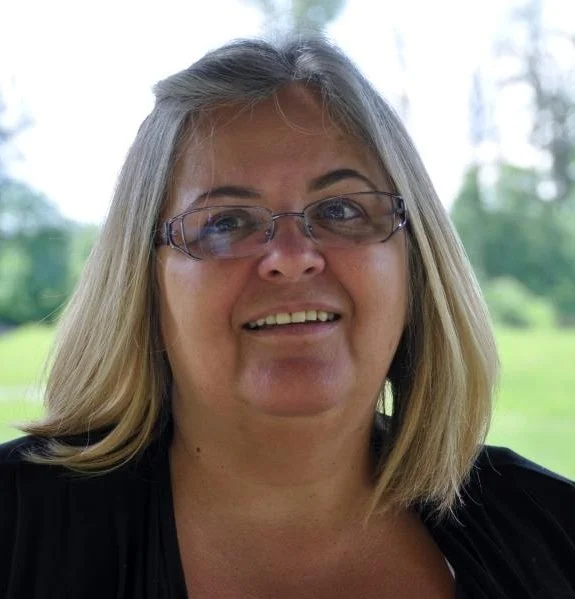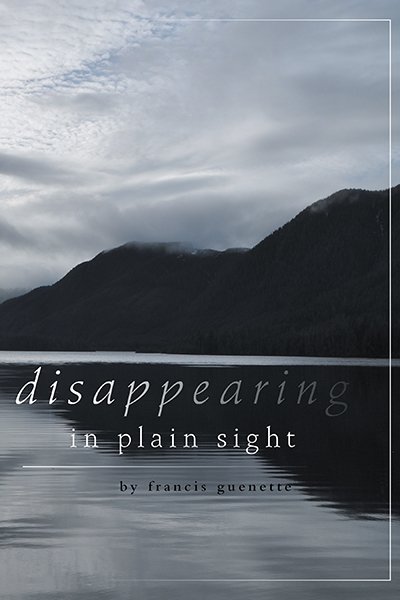Author Interview: Canadian Writer Francis Guenette Talks About Her Writing Process And Journey to Publication
Today I have great pleasure in welcoming to the blog Francis Guenette.
It's wonderful to have a Canadian author visiting Flying Pony. And if there are any writers out there reading this who would like to be part of the Writers on Wednesday Interview Series please let me know
Francis debut novel is Disappearing In Plain Sight.
Thank so much for being my guest Francis and for your insightful answers to my questions.
*
1. What activities (other than writing) get your creative juices flowing?Creativity, for me, has a lot to do with carving out a space where silence can prevail. I need alone time and quiet to allow my thoughts to percolate.Walking has always been the time when I mull over ideas. For years I thought of this as nothing more than daydreaming. When I started to write my first novel, the daydreaming became very focused on a group of characters (and I’m still asking myself where they came from) and how they might handle being tossed into a variety of situations.On a more abstract scale, I think my creativity comes from my curiosity. I’m always wondering – what if? This quality has made me a people observer and every observation becomes more grist to the mill.2. What sort of writing routine do you have – disciplined or undisciplined, regular or erratic, focused or easily distracted?If I’m on my own, I can write twelve hours at a stretch. I might spend the entire day in my PJ’s, eating over the keyboard and forgetting to let the elderly dog out until she makes her needs quite vocal. I’m not sure this equals discipline – feels more like an obsession. But it is what it is.If I’m alone and writing, I’m extremely focused and I can resent the above mentioned dog and even the phone ringing. When other people are around it’s harder for me to maintain focus.When I’m actively writing, I’m very regular about writing every day. I do take extended breaks every few months. I leave the solitude of our cabin by the lake and go out into the world.3. Do you ever suffer from writer’s block and if so what do you do about it?I am happy to say that since I started writing fiction, I have seldom had a serious writer’s block. I did have the experience many times with academic writing and it was agonizing. When I get in a tangle with fiction writing, it’s because I’ve strayed off track. I’m zipping along the writing freeway and whiz down an exit ramp I wasn’t planning to take. The writing bogs down. I have to stop and figure out where I’ve ended up in terms of where I thought I wanted to go. This doesn’t always mean retracing my way – sometimes it means rethinking what has come before or what I have envisioned for later.4. Which aspects of the writing life do you most love?Hands down, I love the experience of being caught up completely in the lives’ of my characters. Having them become so real to me that I can’t let them go – I actually dream about them. They become part of my life. When this happens, the writing flows – it really is as if I can’t take down what the characters are doing and saying fast enough. I begin to hear their voices. I know what they would say in a given situation and how they would say it. This was particularly important in Disappearing in Plain Sight, because I wanted to present the authentic voice of both young people and the adults who surrounded them.5. Which aspects do least love (or detest!)?I have just embarked on the promotion and marketing of my book and even though it’s an exciting process, chalk full of experiences exactly like this guest blog (which, by the way, I love), it is a part of the overall process of having written a book that is not my favourite.I am an introvert who spends most of her time in a wilderness setting, seeing few if any people other than my husband. I have never been a fan of blowing my own horn and this has held me back more than once over the course of my work life.I imagine that my promotion and marketing will end up being what most of my life has been – I’ll read and review your book (if, in good conscience, I can) and maybe you will return the favour. I’ll check out your blog and comment and maybe you’ll do the same for me. I’ve always believed that collaboration based on mutual respect is the way to prosper. And I’ll probably enlist the help of a flaming extrovert friend to help me navigate the public aspects of being published.6. What books and writers have most influenced your own writing?I’ve been influenced by Canadian authors whose novels are firmly rooted in a specific place. Reading these novels gives me a felt sense of what it would be like to live in that area of my country, which includes understanding how the people who do live there are formed by their environment. Some of my favourite Canadian authors who write in this way are: Alistair MacLeod (Cape Breton), Eden Robinson (Pacific Coast), Timothy Taylor (city of Vancouver) Jane Urquhart (rural Ontario), Elizabeth Hay (city of Ottawa, the Canadian North and the prairies), and Wayne Johnson (Newfoundland).I think it has been this influence that made me strive to give the readers of my novel an experience of what rural life, on the Northern end of Vancouver Island, on the Pacific coast of British Columbia, might be like and how it could shape the people who live here.7. Can you describe for us your writing process, from getting the original idea to completed manuscript?With Disappearing in Plain Sight – the first draft came out in a rush – over the space of one summer. I felt in the grip of a writing virus and I couldn’t stop until it had run its course. The first draft was a bare bones structure of what the book turned out to be. I shelved the whole project for a while – too long, but life does intercede. When I came back to it, I found parts that didn’t make as much sense as they could have and themes that needed to be expanded. The second draft added at least one hundred pages. Next was the process of feedback from beta readers and a number of subsequent rewrites followed. At the moment I thought the novel was finished, I was fortunate enough to be told I needed the help of an editor – my story was good, but the book was missing the mark in a couple of key areas. The person I worked with turned out to be a phenomenal copy editor as well as proof reader.(Check out the difference between these two types of editing on http://changeitupediting.com/2013/03/14/copyediting-or-proofreading-5-steps-to-determine-what-you-need/ Change it Up Editing – a great site.)The manuscript went through a major revamp – I had crammed the first few chapters with far too much backstory. Those rewrites were the hardest – it felt as though I had torn the book apart with no way of getting it back together. I also needed to work on point of view issues. For every scene, I had to ask myself, who has the most at stake here? Whose point of view should dominate? Seemingly endless rounds of chapter by chapter editing followed. Then, of course, there were the final proof readings – each time I said final, it turned out the manuscript required just one more.My current novel is coming together in a somewhat different manner. (The Light Never Lies – a sequel to Disappearing in Plain Sight.) I’ve been more organized in the writing – working from a detailed outline with a fair idea of beginning, middle and end. I’m also trying to put into practice what I learned through the endless editing rounds of the last book. I don’t anticipate having to add material this time around; no doubt I’ll find myself in a slashing process. I’ve already eliminated two characters – gone in a few moments of deleting. (Well, they aren’t really gone – maybe they’ll resurface in a third book.)8. Describe your path to publication.Early on, I decided that I would pursue self-publishing without trying to get an agent or submit my manuscript to traditional publishers. My decision was based on a couple of factors. I’ve published academically and a twenty page article accepted to a peer reviewed journal can take upwards of a year from when it is submitted to when it is actually in print. The thought of going through a similar process with an entire book seemed overwhelming. I also considered the gatekeeping function of many traditional publishing houses and this struck me as a major stumbling block for a new author. Then there is the reality of my age – I didn’t want to wait around for something to happen. I researched what indie authors were saying about their experiences and decided it was the right path for me.For my first novel, I wanted someone to hold my hand through the self-publishing process. I chose Friesen Press (http://friesenpress.com/ ). It was pricey and it probably isn’t the route I will go the next time around, but for a novice it has worked out well. I’ve learned so much that I will put to good use when I am ready to publish my next novel.And now for a blatant plug of my own work: Disappearing in Plain Sight is available through Amazon – just follow this link : http://www.amazon.com/disappearing-in-plain-sight-ebook/dp/B00BMHF2IA/ref=tmm_kin_title_0?ie=UTF8&qid=1363299763&sr=1-1If you use an e-reader other than the Kindle please follow links from the Friesen Press Bookstore page - http://www.friesenpress.com/bookstore/title/119734000008622178/francis-l.-guenette-disappearing-in-plain-sight .You can read every single thing you ever wanted to know about me on my blog – http://disappearinginplainsight.com10. What advice would you give to writers who are working towards publication?Don’t give up. This novel took close to four years of my life to bring from initial ideas to publication. I went through periods of despair along the way – the journey is long and sometimes difficult. As I sit now with a published book for sale on Amazon, every bit of the work seems more than worthwhile. As my son told me the other day – many people say they have a book in them, but how many of them actually do the work to make it happen? I say, believe in yourself and be one of the few who do.In order to make that happen, give yourself permission to take what you’re doing seriously. When I worked as a grad student supervisor in a very busy research office, I used to tell the students who were struggling with doubts about their ideas for research – the only committee you need to convince is the one in your own head. I think this speaks to an important truth – we worry a lot about how others will view our ideas and work. When it comes to being a writer, the only person I really had to convince was myself.


